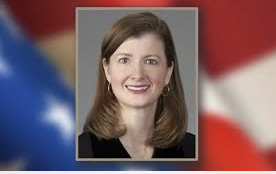Eleventh Circuit Judge Elizabeth Branch told Harvard Law School students that protests she views as antisemitic on law school campuses are a spreading “cancer” that cross the line beyond protected speech.
“What is happening on campuses throughout the country is a cancer. Harvard is similarly stricken,” Branch said Tuesday at a Harvard Federalist Society talk on campus speech in the wake of Hamas’ Oct. 7 attack on Israel.
“I have no quarrel with peaceful protests. I might not agree with you, but I support your right to protest,” said Branch, a Donald Trump appointee who has sat on the Atlanta-based court since 2018. “But that’s not what’s happening.”
She said that pro-Palestine symbols used by protesters including black and white scarves called keffiyeh, hands painted red, and the expression “from the river to the sea, Palestine will be free,” can cross the line from protected speech into threats and incitement of bullying.
Branch urged law school administrators “to stop tolerating the abuse these students are inflicting on campus” and equally enforce speech policies, and recommended law students file written reports against students they believe have violated those policies.
She also criticized groups of law students that have disrupted speakers whose views they disagree with. “You are here to learn how to become lawyers and you cannot become an effective advocate without listening to differing views,” Branch said.
Branch encouraged students who want to protest without causing harm to operate within the guardrails of their school speech policies. Staging a counter protest, attending a speech and asking questions, standing in the back of the room and holding signs, are typically acceptable ways to express disagreement with a speaker, Branch said.
Branch and Fifth Circuit Judge James Ho had warned they wouldn’t hire students from Yale and Stanford law schools as clerks after progressive students interrupted conservative speakers’ remarks.
Another federal judge said he wouldn’t hire law clerks that signed onto letters he viewed as supporting Hamas. Some law firms have rescinded employment offers to students over their public statements about the war.
Congress is currently investigating Harvard for its response to antisemitism complaints following the Oct. 7 attacks, and students have sued the university alleging it violated federal civil rights protections.





